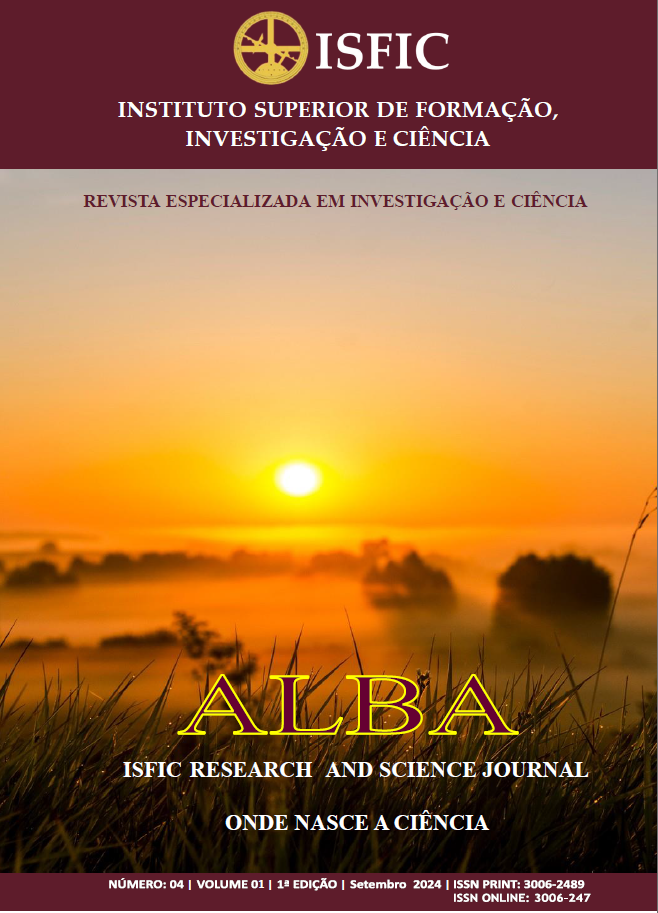A SUSTENTABILIDADE EMPRESARIAL EM MOÇAMBIQUE: A PREDITIVIDADE DA MEDICÃO IMPACTO AMBIENTAL E RESULTADOS E ÉTICA NOS NEGÓCIOS NA TOMADA DE DECISÃO COM BASE NOS CRITÉRIOS ESG
Palavras-chave:
Sustentabilidade, preditividade, ESGResumo
Nos últimos anos, a sustentabilidade empresarial se tornou cada vez mais crucial para as organizações, em resposta à crescente conscientização sobre a preservação ambiental e responsabilidade social. As empresas têm a oportunidade de adoptar medidas voltadas para o desenvolvimento sustentável, assegurando a longevidade de seus negócios e contribuindo para um mundo melhor, conforme definido pelo Pacto Global das Nações Unidas. Essa definição ressalta a importância da sustentabilidade empresarial nas dimensões económica, ambiental e social. Um estudo quantitativo, descritivo, exploratório e correlacional foi conduzido, envolvendo funcionários de empresas moçambicanas e cidadãos de Moçambique. A pesquisa foi realizada individualmente por meio de questionários eletrónicos, demonstrando a relação entre sustentabilidade empresarial, impacto, ética nos negócios e a tomada de decisão da ESG. Os resultados apontam que a sustentabilidade empresarial, o impacto e a ética nos negócios influenciam positivamente a tomada de decisão da ESG. A multicolinearidade não afecta significativamente as estimativas, o que demonstra a confiabilidade do modelo, este trabalho contribui significativamente para o campo da ESG, encorajando as organizações a adoptarem estratégias mais responsáveis e impactantes alinhadas com os princípios da ESG em busca de um futuro mais sustentável e ético.
Downloads
Referências
ClarkL.Gordon, FeinerAndreas, & ViehsMichael,. (2014). From the Shareholder to the Stakeholder: How Sustainability Can Drive Financial Outperformance. Do acionista ao stakeholder: como a sustentabilidade pode impulsionar o desempenho financeiro, SSRN: https://ssrn.com/abstract=2508281 ou http://dx.doi.org/10.2139/.
Duque-Grisales, Eduardo, & Aguilera-Caracuel.Javier. (2021). “Environmental, Social and Governance (ESG) Scores and Financial Performance of Multilatinas: Moderating Effects of Geographic International Diversification and Financial Slack.”.” Journal of Business Ethics 168(2)., doi: 10.1007/s10551-019-04177-w.
Eccles G Robert, & Serafeim George. (2013). The Performance Frontier: Innovating for a Sustainable Strategy. A Fronteira da Performance: Inovando para uma Estratégia Sustentável, Harvard Business Review 91, nº 5 (maio de 2013): 50–60.
Faul F., Erdfelder E., Lang A. G., & BuchnerA. (2007). G*Power 3: A flexible statistical power analysis program for the social, behavioral, and biomedical sciences. Behavior Research Methods, 39, 175-191. https://doi.org/10.3758/BF03193146.
Formiga, N. S. (2007). Valores humanos e sexismo ambivalente. Revista do Departamento de Psicologia – UFF, 19(2), 381-396.
Hair F.Joseph, Black C.William, BabinJ.Barry, & AndersonERolph. (2005). Multivariate data analysis (Bookman (ed.); 5 ed. Análise Multivariada de Dados, ISBN: 473756693 / 9781473756694 / 1473756545 / 9781473756540.
Hair W. C.B., BabinJB., Anderson E. R., & Tatham L.R. (2009). Multivariate Data Analysis. 6ª edição. Upper Saddle River, NJ: Pearson Prentice Hall.
Marôco J. (2010). Análise de Equações Estruturais. Fundamentos Teóricos, Software e Aplicações. Report Number, Lda. Lisboa.
Michael E. Porter, Mark R. Kramer. (2011). Criação de valor compartilhado ''Como reinventar o capitalismo e desencadear uma onda de Inovação e crescimento''. EUA: Harvard Business Review.
Miot A.H. (2017). Assessing normality of data in clinical and experimental trials. Jornal Vascular Brasileiro, 16(2), 88-91. https://doi.org/10.1590/1677-5449.041117.
Nascimento D., Tibana R., Melo G., & Prestes J. (2015). Tests of Normality in Statistical Analysis: A Guidance For Practitioners In Health Sciences And Physical Activity. Revista Mackenzie de Educação Física e Esporte, 14(2), 73-77.
ONU. (2015). United Nations Global Compact - Objetivos de Desenvolvimento Sustentável e da Agenda 2030. iniciativa especial do Secretário-Geral das Nações Unidas dedicada à sustentabilidade, que teve a sua origem numa proposta do Secretário-Geral da ONU Kofi Annan, em 2000.EUA: https://globalcompact.pt/index.php/pt/un-global-compactempresas.
Podsakoff, M.P., MacKenzie, B. S., Lee, Y.J., & Podsakoff, P.N. (2003). Common Method Biases in Behavioral Research: A Critical Review of the Literature and Recommended Remedies. Journal of Applied Psychology, 88(5), 879-903. https://doi.org/10.1037/00.
Tabachnick B.G, Fidell L.S, & OsterlindSJ. (2001). Usando estatísticas multivariadas. Allyn e Bacon, Boston.
TTranfield D., Denyer D., & Smart P. (2003). Towards a Methodology for Developing Evidence-Informed Management Knowledge by Means of Systematic Review. British Journal of Management, 14, 207–222. https://doi.org/10.1111/1467-8551.00375.
WEF. (2020). Measuring Stakeholder Capitalism. Toward Common Metrics and Consistent Reporting of Sustainable Value Creation. Toward Common Metrics, https://www3.weforum.org/docs/WEF_IBC_ESG_Metrics_Discussion_Paper.pdf desponivel : 25/07/2023.
World Economic Forum " Fórum Econômico Mundial''. (2020). stakeholders para um mundo coeso e sustentável. DAVOS-KLOSTERS, SUÍÇA: Reunião Anual do Fórum Econômico Mundial.
Yusoff, MSB (2019). ABC da Validação de Conteúdo e Cálculo do Índice de Validade de Conteúdo. Revista Educação em Medicina, 11, 49-54. https://doi.org/10.21315/eimj2019.11.2.6







